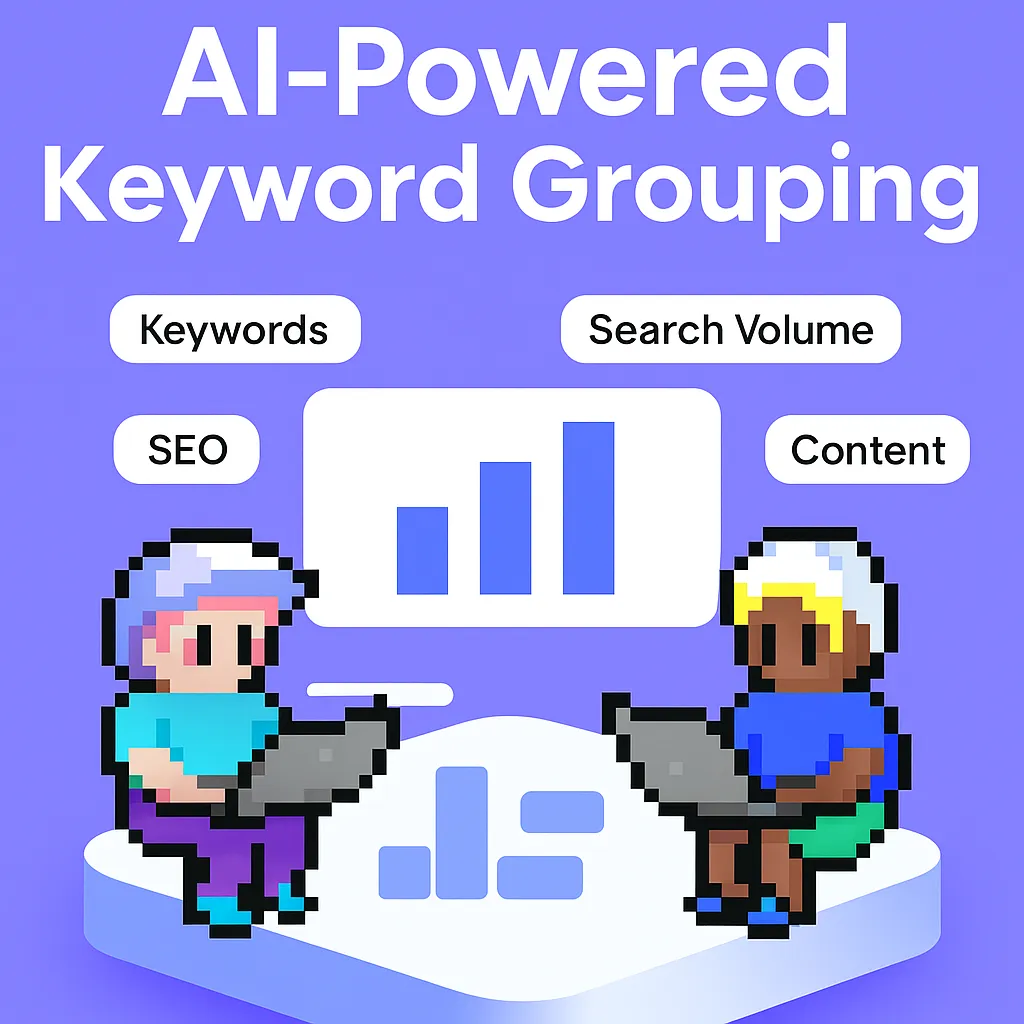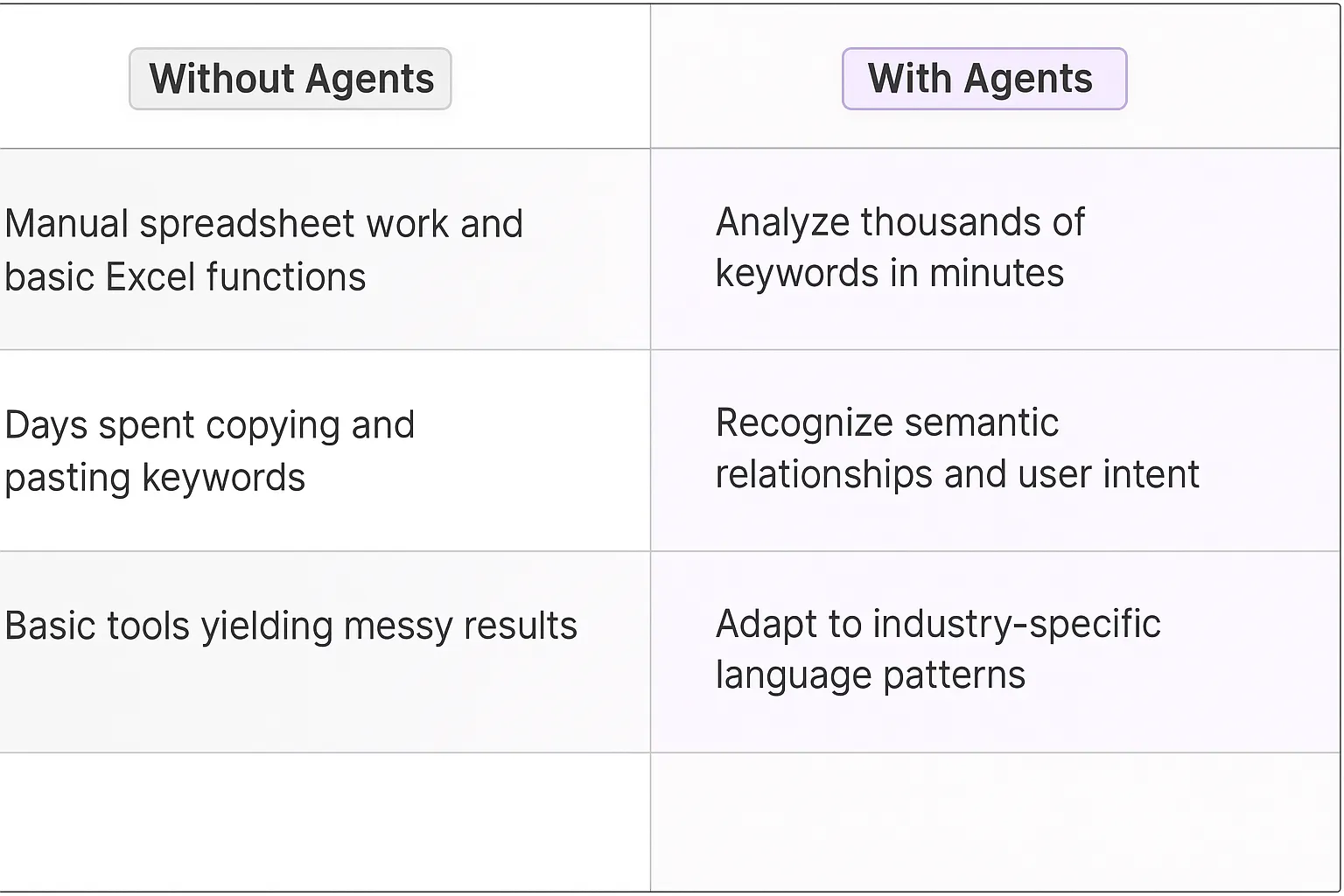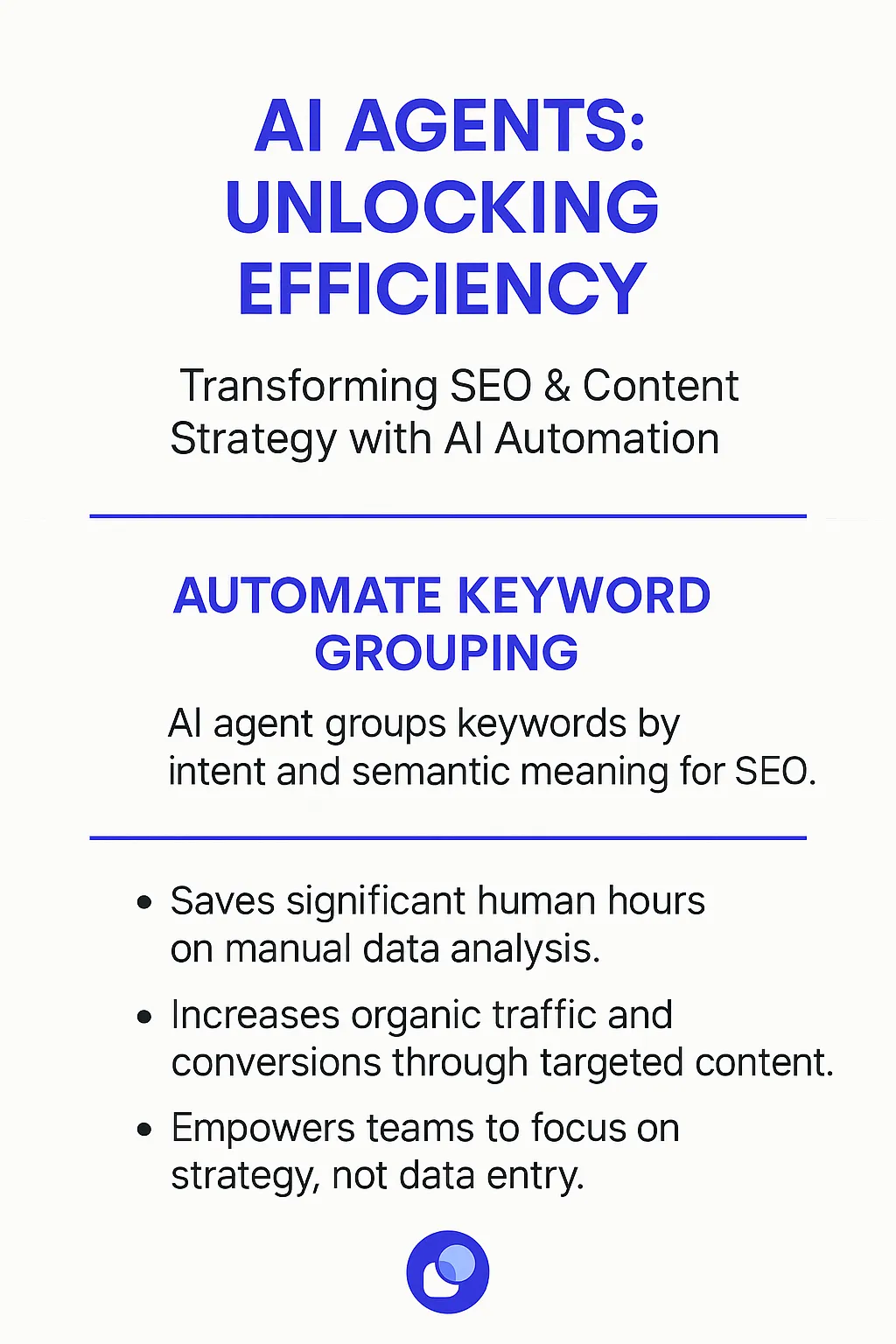Keyword Grouping AI Agents
Understanding AI-Powered Keyword Organization
Keyword grouping is a sophisticated process where AI agents analyze search terms and organize them into meaningful clusters based on semantic relationships, user intent, and commercial value. Unlike traditional manual methods, these digital teammates process vast amounts of data to identify patterns and connections that drive strategic content decisions.
Key Features of Keyword Grouping
- Natural Language Processing that understands contextual meanings and user intent
- Pattern recognition capabilities that identify semantic relationships across thousands of keywords
- Adaptive learning systems that improve grouping accuracy over time
- Real-time analysis of search trends and user behavior
- Integration with existing SEO and content workflows

Benefits of AI Agents for Keyword Grouping
What would have been used before AI Agents?
The old-school SEO workflow was painfully manual. Marketing teams spent countless hours copying and pasting keywords into spreadsheets, trying to spot patterns and relationships between search terms. They'd rely on basic Excel functions, pivot tables, and their own intuition to group keywords - often missing valuable connections and semantic relationships. Some used basic clustering tools, but these required significant human oversight and often produced messy, unusable results.
What are the benefits of AI Agents?
The network effects of AI-powered keyword grouping are fascinating. When you deploy these digital teammates for SEO, you're tapping into deep language models that understand semantic relationships at a scale humans simply can't process.
First, there's the speed advantage - what used to take days now happens in minutes. But it's not just faster, it's smarter. These AI agents recognize contextual patterns that even experienced SEOs might miss. They can identify topic clusters across thousands of keywords simultaneously, understanding subtle differences between user intent and search behavior.
The real game-changer is how these agents adapt and learn. They pick up on industry-specific language patterns and can group keywords based on both semantic meaning and commercial intent. For example, they'll understand that "best running shoes for marathons" and "marathon training footwear" belong in the same group, even though they share no exact keywords.
What's particularly powerful is the compound effect: as these agents process more data, they become increasingly sophisticated at understanding your specific market niche. They start recognizing subtle patterns in user language that can inform your entire content strategy, not just your keyword grouping.
The bottom line? You're not just saving time - you're uncovering opportunities that would have remained hidden in traditional manual analysis. This leads to more targeted content strategies and better alignment with how your users actually search and think about your products or services.

Potential Use Cases of Keyword Grouping AI Agents
Processes
- Transform raw keyword data into actionable content clusters by analyzing search intent and semantic relationships
- Identify content gaps in your existing site architecture by mapping keyword groups to your current pages
- Build topic authority by organizing keywords into thematic pillars that search engines can easily understand
- Create data-driven content calendars based on keyword difficulty and search volume patterns
- Optimize internal linking structure by connecting related keyword groups and content pieces
Tasks
- Analyze thousands of keywords in seconds to identify natural groupings and patterns
- Sort keywords by user intent (informational, transactional, navigational)
- Generate topic clusters with primary and secondary keywords
- Map keywords to different stages of the customer journey
- Create SEO-optimized content briefs based on keyword groups
- Identify seasonal keyword trends and opportunities
- Filter and prioritize keywords based on metrics like search volume, competition, and CPC
The Growth Impact of Keyword Grouping AI
When we look at content strategy, the 80/20 rule applies hard - most teams waste countless hours manually sorting keywords when they could be focusing on creative execution. Keyword grouping AI agents flip this equation on its head.
The real power comes from the compound effects: faster content planning leads to more consistent publishing, which builds topical authority faster. Your digital teammates handle the heavy lifting of data analysis while your human team focuses on crafting compelling narratives that actually move the needle.
For growth teams, this creates a powerful flywheel effect. Better organized keyword groups inform smarter content briefs, which lead to higher quality content that ranks faster. The AI's pattern recognition abilities also surface opportunities humans might miss - like seasonal trends or emerging topics before they peak.
The most successful teams I've worked with use keyword grouping AI as their content strategy co-pilot, not just a basic clustering tool. They're leveraging it to build comprehensive topic authorities that capture both high-intent commercial terms and supporting informational content.

Industry Use Cases
Keyword grouping AI agents are fundamentally changing how teams approach content strategy and SEO optimization. Drawing from my experience working with growth teams, I've seen these digital teammates transform scattered keyword research into strategic content roadmaps. Marketing teams at Series A startups through Fortune 500 companies leverage these AI agents to process thousands of keywords in minutes, identifying patterns and relationships that would take days to map manually.
The real power lies in how these agents adapt to different vertical markets and content needs. A D2C beauty brand might use them to cluster product-specific terms with user intent, while a B2B SaaS company could map technical keywords to different stages of their sales funnel. This granular understanding of keyword relationships enables teams to build content that genuinely resonates with their target audience's search behavior.
What's particularly fascinating is how these AI agents learn from industry-specific patterns. They recognize that "cloud storage pricing" and "cloud storage costs" might belong in the same group for a tech company, while "organic moisturizer benefits" and "natural face cream advantages" should cluster together for a skincare brand. This contextual awareness makes them invaluable for businesses looking to dominate their specific market segments.
E-commerce Product Taxonomy Made Simple
Running a large e-commerce marketplace is like organizing the world's biggest garage sale, except everything needs to be perfectly categorized. I've seen countless marketplace founders struggle with this exact problem - they have thousands of SKUs but no systematic way to group them.
A Keyword Grouping AI Agent transforms this chaos into order. When I worked with a home goods marketplace startup, they were manually sorting through 50,000+ product listings. Their team spent countless hours trying to create logical category hierarchies, but inconsistencies kept creeping in.
The AI Agent analyzed their entire product catalog, identifying natural language patterns and semantic relationships between product descriptions. It automatically clustered items like "ceramic pour-over coffee maker" with "manual coffee dripper" and "pottery coffee filter" - connections that weren't obvious at first glance.
The real magic happened when the Agent started suggesting new category opportunities. It noticed patterns like "sustainable kitchen items" and "small-space cooking tools" - valuable segments the team hadn't considered. These AI-generated insights led to a 34% improvement in conversion rates because customers could finally find exactly what they were looking for.
Beyond just grouping, the Agent continuously learns from user search behavior. When shoppers frequently search for "pet-friendly houseplants" but that category doesn't exist, the Agent flags this as a potential new grouping. This dynamic approach keeps the taxonomy fresh and aligned with actual customer needs.
The bottom line: Keyword Grouping AI Agents turn the tedious task of product categorization into a strategic advantage. For marketplaces, this means better discovery, higher conversion rates, and the ability to scale their catalog without scaling their taxonomist headcount.
Content Marketing Teams Scale Production with AI-Powered Topic Clustering
I recently spoke with the head of content at a major SaaS company who was drowning in spreadsheets trying to map out their content strategy. Their team of writers was producing great articles, but they lacked a coherent structure to connect everything together. This is a common growth bottleneck I see in content operations.
A Keyword Grouping AI Agent transformed their content planning from art to science. The Agent analyzed their existing 2,000+ blog posts alongside competitor content, search trends, and user engagement data. Within hours, it identified distinct topic clusters they hadn't spotted - like the connection between "remote team productivity" and "asynchronous communication tools."
What's fascinating is how the Agent uncovered content gaps by analyzing semantic relationships. It found that while they had extensive content about "project management," they were missing key subtopics around "cross-functional collaboration" that their audience frequently searched for. This insight led to a new content series that drove 45% more organic traffic.
The Agent also helped solve the age-old content marketing problem of cannibalization. When multiple articles competed for the same keywords, the Agent suggested ways to merge, redirect, or differentiate the content. One content team I advised reduced their total article count by 15% while increasing overall organic traffic by 28%.
Perhaps most valuable is the Agent's ability to identify trending topics before they peak. By analyzing search patterns and social media discussions, it spots emerging themes that content teams can capitalize on early. This helped one B2B software company become the go-to resource for "privacy-first analytics" before the topic exploded.
The growth implications are significant: content teams can now produce more strategically aligned content with fewer resources. Instead of guessing what to write next, they have AI-powered insights guiding their editorial calendar. This is the kind of leverage that helps content strategy operations scale efficiently.
Considerations & Challenges
Implementing keyword grouping AI agents requires careful planning and awareness of several critical factors that can make or break your implementation. Let's dive into the key challenges teams face when deploying these digital teammates.
Technical Challenges
The accuracy of keyword grouping depends heavily on the quality and quantity of training data. Many teams underestimate the volume of properly labeled data needed to achieve reliable results. You'll need thousands of examples covering different industries, languages, and semantic relationships.
Language complexity poses another significant hurdle. English alone has countless idiomatic expressions, contextual meanings, and industry-specific terminology. Your keyword grouping agent needs sophisticated natural language processing capabilities to handle these nuances effectively.
Operational Challenges
Integration with existing workflows often proves trickier than expected. Your team needs clear protocols for when to use the AI agent versus manual grouping, especially for high-stakes projects where accuracy is crucial.
The learning curve can be steep for team members used to traditional keyword grouping methods. Plan for dedicated training time and create detailed documentation covering edge cases and troubleshooting steps.
Data Quality Considerations
Garbage in, garbage out applies strongly here. Your keyword grouping agent needs clean, consistent data to produce reliable results. Establish strict data validation processes and regular quality checks to maintain grouping accuracy over time.
Consider implementing a human-in-the-loop system for sensitive projects or when dealing with new industry verticals. This hybrid approach helps catch errors while continuously improving the agent's performance through feedback loops.
Scalability Factors
As your keyword volumes grow, processing speed and resource consumption become critical factors. Monitor your agent's performance metrics closely and set up alerts for when processing times exceed acceptable thresholds.
Build in redundancy and failover capabilities to handle spikes in demand. Nothing kills team adoption faster than an unreliable system that crashes during crucial projects.
The Future of AI-Driven SEO and Content Strategy
The shift to AI-powered keyword grouping represents a fundamental evolution in how we approach SEO and content strategy. The network effects are clear - as these digital teammates process more data, they become increasingly sophisticated at understanding market niches and user behavior patterns. Teams that embrace this technology gain a significant competitive advantage through better-organized content hierarchies, more targeted topic clusters, and the ability to scale their SEO efforts efficiently. The future of keyword grouping isn't just about automation - it's about unlocking deeper insights that drive meaningful growth.













